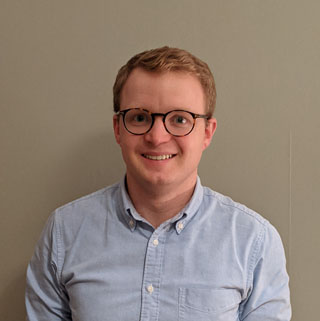Doug is a clinical research fellow in his second year of doctoral training working with Prof Sara Zanivan and Dr Rosalind Glasspool. His project focuses on the metabolic interplay between cancer-associated fibroblasts and tumour cells. Using cutting edge proteomics, he aims to identify vulnerabilities that can be exploited for therapy in ovarian carcinoma metastases.
What motivated you to do a PhD?
During my undergraduate I was fortunate to have some incredible mentors who gave me opportunities to do research and encourage me to pursue an academic career. A PhD or other higher degree is really the first opportunity to develop the necessary skills to be a clinical academic.
What is your educational background?
I did my MBBS at University College London and also did an intercalated BSc in Surgical Sciences during that time. I did my foundation training in Birmingham before moving to Glasgow for core medical training. I started my PhD straight after core medical training, so it is possible to do even if you are not in higher specialty training.
How did you select your project?
Aside from the more obvious reasons, such as interest in the subject or specific research question of the project, I thought about the skills I could learn during the project. The PhD is in many ways a training program and you become an expert in the techniques you use. One thing that attracted me to the project I’m doing was the opportunity to learn mass spectrometry-based proteomics at a world leading facility.
Do tell us a little bit about your PhD project
The aim of my project is to identify targetable crosstalk signalling between cancer associated fibroblasts (CAFs) and cancer cells in high grade serous ovarian cancer. To do this we are using laser capture microdissection to isolate cancer cells and CAFs from clinical specimens and analysing them using mass spectrometry-based proteomics. We then aim to validate any targets using co-culture experiments of CAFs and cancer cells.
Talk us through your typical day
Things have changed a bit in COVID times so now I usually spend half the day the lab and half the day working from home. What I do in the lab varies week to week but might be dissected samples using the microscope, preparing them for mass spec analysis or processing new samples from the biorepository. At home I am usually do my data analysis or review literature. We have had to be a bit more flexible with working hours due to the restrictions so I sometimes in the lab in the evenings or weekends but you also have some more flexibility when working from home.
What has it been like so far? What have you found challenging?
I have really enjoyed my first year. One of the hardest things in finding your feet. For the first 6 months I felt a bit out of my depth and like everyone was talking a different language. With time you get a handle on your subject and start to feel like you can contribute more to the group.
One thing I have really enjoyed is the additional opportunities to go to meetings, courses, and meet researchers from around the country. When you are doing clinical work it is often easy to forget that there are things outside the wards and many of the things that would help us in our training we are too busy to go to. During your PhD you have control over your time so I have been to some amazing meetings and courses both within the University and externally.
How much clinical work are you doing?
I do one medical oncology clinic a week with my 2nd supervisor. I also do some oncology SPR out of hours on calls but the rota is very manageable.
What advice would you give to someone interested in a CRTF?
My main advice is to try and meet the group leader them to talk more in depth about the project before you apply. I was able to learn more about the project before the interview and my supervisor helped me loads with recommended reading and how to explain certain aspects of the project if question on it.
Lastly, if you’re are interested just apply. It’s a great institute and an amazing opportunity.
